#Racially Motivated Politics
Explore tagged Tumblr posts
Text

#Melanin#Black Panther Party For Self Defense#Black Group Economics#Black Family Imagery#Emasculate Agenda#Defeminize Agenda#Black Yout#Black Man & Black Lady#Love Is A Man & Lady#Eugenics#Ethnic Cleansing#Black History#Dr Neely Fuller Jr#Stop Police Brutality#Racially Motivated Politics#Negro Spirituals#White Supremacy#Revolutionary#Rev Dr Martin Luther The King#Africa#Cuba#Caribbean#Pacific Islands#Melanesia#Australia#New Zealand#Americas
5 notes
·
View notes
Text
Feel like pure shit, just want John Stewart to be an architect again.
#why is dc making all of the green lanterns into military/cops before being gls#out of the four corpsmen Kyle is the last one standing#also 70s passionate politically active architect Jon was so fun#I want him back#john stewart#green lantern#I get why Timm and Dino were worried about him leaning into the angry black man (even if in context it feels less dramatic beside Ollie)#But removing is struggle with racial discrimination in his field and opposition to inequality completely was imo a mistake#If you can’t have a black character whose a social activist without making them a walking stereotype#Especially when said character had other motivations and passions and a cool job#That’s on you sorry
6 notes
·
View notes
Text
#police brutality#police union#racially motivated police brutality#police#vital community#vitalportal#additional information#vital information exchange#thevitalportal#vital media#blacklivesmatter#blacktwitter#vital politics
19 notes
·
View notes
Text
is it just me or is it a bit insensitive to share like. genuine tragic news via the destiel confession meme. like guys i get it but maybe we shouldn’t be putting news of mass shootings in a fucking meme format.
#anyways !! i hate america i hate guns i hate the fact that ppl i know could be hurt or dead i hate that this happened at all#idk man im just kinda shaken cause shit like this never really happens where im from#and even if im not from lewiston ik that it has a big immigrant population so theres a chance the attacks mightve been racially motivated#or that the news might try to spin this in a way that blames the somali population there#goddamn. idk man.#politics#us politics#bardic ranting#tw vent#<— cause of the tags idk#ok to rb idc
6 notes
·
View notes
Text
Ron DeSantis has always been "Mask Off"
This isn't a new thing. It's a pattern of behavior.
That pattern of behavior is what led us here. Gun violence is a human problem. Human problems have human solutions. The first mass shooting in America happened in 1966. Human solutions includes good policy. You can make as many policies based on mental health that you want, but racism isn't a mental illness.
Ron DeSantis has blood on his hands.
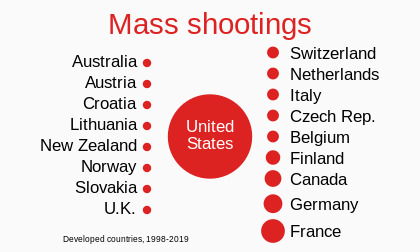
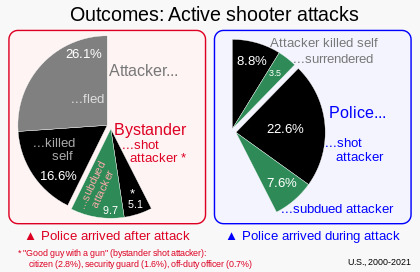
Photo/Pie Chart Credit: New York Times
#politics#us politics#graphs#charts#news#breaking news#true crime#ron desantis#pattern of behavior#Jacksonville#jacksonville florida#racism#discrimination#racially motivated#dollar general#racial discimination#vigil#abc news#npr news#new york times
2 notes
·
View notes
Text
slow horses a very fun little spy show. insane politics
#hates mi5 but IS mi5 (shit division) and they’re trying to stop a right wing racially motivated beheading#that was started as a pr ploy in fact BY mi5. but don’t worry guys these guys (again. mi5.) are here to stop it#it’s like weird mi5 class politic but they’re all cops so#anyways i do enjoy the show nonetheless#callie speaks#kind of show where quality of tailoring denotes level of evil but again#they all work for MI5…..
1 note
·
View note
Text
Reassessing Trujillo’s Motivations
Was Rafael Trujillo’s offer to shelter Jewish refugees during WWII truly compassionate? Explore the complex motives behind his “humanitarian” act, from racial agendas to image repair. #UnmaskingTrujillo #HistoryExplored #SosúaSettlement #JewishRefugee
Part 4: “A Double-Edged Deed: Was Trujillo’s Offer to Jewish Refugees Truly Altruistic?” At first glance, Rafael Trujillo’s offer to shelter Jewish refugees fleeing Nazi persecution seems compassionate. It seems like an act of profound humanity. Yet, as we peel back the layers of his motivations, a more morally ambiguous picture emerges. His decision to allow Jewish refugees into the Dominican…
#Dominican dictator#Dominican Republic history#hidden agendas#Historical Analysis#humanitarianism in politics#Jewish refugees#moral complexity#political ethics#racial motives#Sosúa settlement#Trujillo’s motives#WWII refugees
1 note
·
View note
Text
Three dead in 'racially motivated' shooting in US convenience store
By CNN, Associated Press, 9:21am Aug 27, 2023
Three people were shot and killed at a Dollar General store in Jacksonville, Florida, in what policedescribed as a racially motivated incident.
"This shooting was racially motivated and he hated Black people," Jacksonville Sheriff T.K Waters said at a news conference.
He said the shooter, who is White and is also now dead, left behind evidence that outlined his "disgusting ideology of hate" and his motive in the attack.
All three victims were Black.

Police respond to the scene of a mass shooting at a Dollar General store. (AP)
Waters said the shooter, who was in his 20s, used a Glock handgun and an AR-15 semi-automatic rifle.
It's understood the assault rifle was covered in Nazi swastikas.
He left behind writing that led investigators to believe that he committed the shooting because it was the fifth anniversary of when another gunman opened fire during a video game tournament in Jacksonville, killing two people before fatally shooting himself.

Residents gather for a prayer near the scene of a mass shooting. (AP)
The shooting happened blocks away from Edward Waters University, a historically Black school where students living on campus were told to stay in their residence halls.
The suspected shooter was barricaded in the store after opening fire and leaving "multiple fatalities," Jacksonville Mayor Donna Deegan said.
State Sen. Tracie Davis told CNN the suspect is now dead.

Authorities report to the scene of a shooting in Jacksonville, Florida (CNN)
The circumstances surrounding the shooter's death are unclear. It was not immediately clear if victims were shot inside or outside the store.
Jacksonville Fire and Rescue Department spokesperson Eric Prosswimmer told CNN the department was "on standby" to treat victims but could not share any information about how many people were hurt.
Jacksonville is located in northeast Florida, about 56 kilometres south of the Georgia border.

There are "multiple fatalities" from a shooting in Jacksonville. (WJXT)
Edward Waters University, a historically Black private Christian school that is located less than a mile southeast of the store, issued campus-wide stay-in-place order. The warning said students, faculty and staff don't appear to be involved, according to preliminary reports.
"Our campus police have secured all campus facilities. Students are being kept in their residence halls through the afternoon until the scene is cleared," the alert said.
Davis, whose district includes Jacksonville, called the shooting a "tragic day" for the city in a post on X, the platform formerly known as Twitter.
"I'm offering prayers to the families of the victims and am on my way to meet with (Jacksonville Sheriff T.K. Waters) for answers," Davis posted Saturday.
"This type of violence is unacceptable in our communities," Davis added.

It was not immediately clear if victims were shot inside the store or at a different location. (WJXT)
There have been at least 470 mass shootings in the United States so far in 2023, according to the Gun Violence Archive, which defines a mass shooting in which four or more people are injured and or killed, not including the shooter.
The nation surpassed the 400 mark in July, - the earliest month such a high number has been recorded since 2013, the group said.
The gun violence in Jacksonville marked one of several reported shooting incidents in the US over two days, including in Massachusetts and Oklahoma.
Shots rang out across several cities, bringing a startling halt to normal summertime activities like high school football games and weekend shopping.
In Boston, at least seven people were injured Saturday morning in a shooting that interrupted a popular parade, police said.
A high school football game in Choctaw, Oklahoma, took a deadly turn Friday night after a possible argument led to three people being shot, authorities say.
One of them - a 16-year-old boy - died. And Four people, including a 17-year-old, were killed at an apartment in Joppatowne, Maryland, Saturday morning, officials said.
#terrorwave#terror wave#terror#news#america#usa#politics#racist#shooting#choctaw#oklahoma#T.K Waters#T.K. Waters#T.K#t k waters#jacksonville#edward waters university#racially motivated#three dead
0 notes
Text
Agatha All Along, the highly anticipated follow-up to WandaVision, begins airing this week on Disney+. Now is the perfect to revisit some important information about both shows and the context in which some of Agatha's new characters are being introduced.
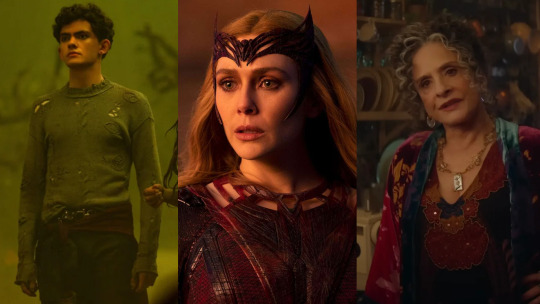
WandaVision primarily followed the character Wanda Maximoff and expanded on her family history by introducing her late parents as well her twin sons, who are born from magic and age rapidly over the course of the series.
In the Marvel comics source material, Wanda is part of a large, multigenerational family of Jewish and Romani characters whose stories frequently reflect the systemic violence and oppression that both communities face-- including Romani Holocaust victims, who are critically underrepresented in both education and media. In the MCU, these identities and histories are completely erased, and the characters are all played by white actors. Alternate versions of these characters also appear in the Fox X-Men films, and are similarly whitewashed.
The Romani people are a racialized minority that originated as a South Asian diaspora, and who face severe systemic oppression in Europe and North America. The modern Romani population is quite diverse, but they are not of white ethnic origin, and despite the fact that Wanda and her family have historically been drawn with white features, they are minority characters and ought to be considered as such.
Depictions of witches and witchcraft are often entwined with antisemitism and anti-Romani racism. In pop culture, witches and fortunetellers are typically portrayed as visual stereotypes of Romani women. In the real world, fortunetelling is a profession born from survival work, one which Romani families are often heavily policed and racially profiled for practicing. While Wanda usually subverts these tropes, they are often played straight elsewhere in the superhero genre, and any story about witches, especially one featuring Romani characters, needs to be critiqued in this context.
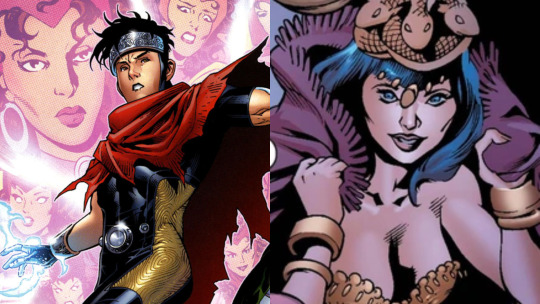
Agatha All Along introduces viewers to a new cast of characters, including Lilia Calderu, played by Patti LuPone, and the enigmatic "Teen", played by Joe Locke, who is heavily speculated to be an incarnation of Wanda's son, Billy.
In the comics, Lilia is a member of a prominent Romani family in Wanda's community. Often lauded as the "witch queen of the gypsies," Lilia embodies many racial stereotypes about Romani women. In Agatha All Along, Lilia is depicted as an older Sicilian woman, however, being portrayed as a batty fortuneteller with a tawdry psychic shop, she still embodies an offensive trope. Although Lilia is far from "good" representation, this is not an improvement-- if anything, it's even more exploitative.
Billy was raised in a Jewish American household and places a very strong emphasis on his Jewish identity, in addition to having Romani heritage. His identity as a young gay man is always presented in conjunction with this heritage, not in spite of it. Though there is a significance to Locke being a gay actor playing a gay character, his casting-- if he is indeed playing Billy-- is not authentic. White gay representation should not supersede racial inclusivity, and it is not an excuse for whitewashing or Jewish erasure.
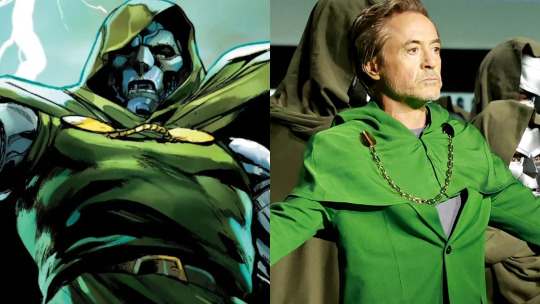
Marvel Studios recently announced that the character Doctor Doom will be played by Robert Downey Jr., who is returning to the franchise after many years in the role of Iron Man. In the source material, Doom is also a Romani character with a very similar background to Wanda's. This identity is central to Doom's character-- although he is written to be both morally and politically challenging, the liberation of his people has always been a primary motive.
Clearly, this type of whitewashing is an ongoing pattern in the MCU franchise. Although "Teen's" identity is still unconfirmed and Lilia may, ultimately, be of little consequence, they are part of a larger problem, and Agatha All Along needs to critiqued in that context.
#agatha all along#billy kaplan#wiccan#joe locke#patti lupone#lilia calderu#wanda maximoff#scarlet witch#doctor doom#victor von doom#robert downey jr
738 notes
·
View notes
Text
essential reading for Kabru lovers and dunmeshi world building enthusiasts
Kabru, impossible mutual understanding & unknowable objects
Despite his concerted and constant efforts to understand other people, it’s established in a few extras that Kabru believes that true mutual understanding between certain different races is impossible. Specifically, between long-lived and short-lived races, and between humans and demi-humans. Partially, we can trace this conviction back to specific hang-ups caused by his life; the trauma of the Utaya disaster, prejudices he carries from his childhood, and his experience of racism among the elves. In this “little” essay, I’m gonna discuss how I think those experiences formed this belief, how it comes out in his actions, and how some of his actions seem to contradict it. The question of whether it’s possible to reach mutual understanding with other living beings despite our differences is one of the core themes of the manga, and I’ll also touch on how this aspect of Kabru’s character links to that.
Seeking understanding
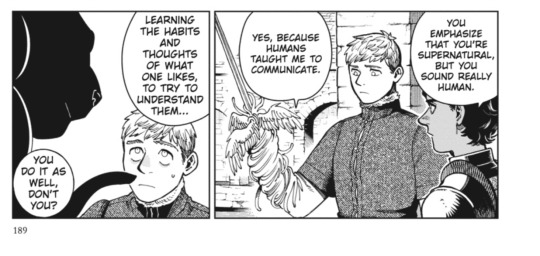
Kabru is a character who devotes a huge amount of time and effort to understanding people, and he is very good at it. In his internal monologue, we can tell how advanced and complex his skills of analysis are. He is able to read a huge amount of information just from looking at people's faces and body language.


People are, to him, what monsters are to Laios. This is something that's been expanded on at length in other, excellent meta. It's the fact that they're foils; it's the fact that Kabru is also very easy to read as autistic, with a special interest which is the opposite and parallel of Laios'. It's something that came out of trauma and alienation, as Laios' special interest in monsters also began as a coping mechanism.
The complicated origin of this "love" for monsters and for people comes through, I think, in the fact that one of the places we see both characters use their fixation is in being very, very good at killing the thing that they love. This also ties into the idea that loving something isn't even remotely mutually exclusive with using it to sustain your own survival; using it for your own purposes; hurting it or killing it. Love can be, and often is, violent, possessive and consumptive. This understanding is part of what makes Kui's depiction of interpersonal relationships so compelling to me.
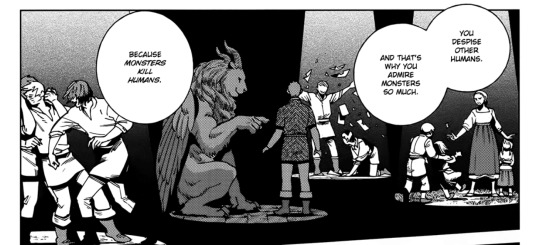
While Laios fixated on monsters and animals to seek a place of escape, in both his imagination and his self-image, from the humans who he couldn't understand and who couldn't understand him, Kabru seems to have fixated on understanding people in order to navigate the complex, socially marginal places that he has been forced into throughout his life. As an illegitimate child raised by a single mother with an appearance that marked him out as different to the point his father's family wanted to kill him, and a tallman child raised among elves who didn't treat him as fully human and wanted him to perform gratefulness for that treatment – treatment that, after he met Rin at age 9, he certainly always understood could be a lot worse – his ability to work out what people wanted from him, whether they were friendly or hostile or had ulterior motives, wasn’t just an interest. It will have been an essential skill.
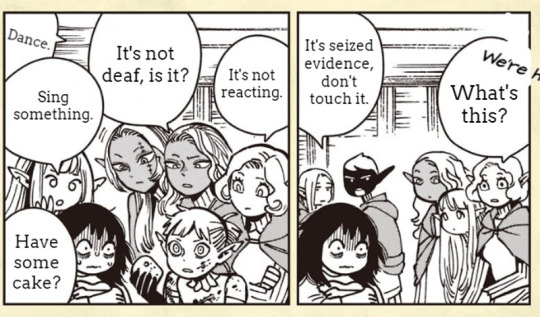
Milsiril, I think, was a flawed parent who tried to do her best by Kabru and did a lot of harm to him despite her best intentions. She may have treated him much better than an average elf would have, but like Otta and Marcille's mother, there are other elves with different outlooks on short-lived races. How would they judge her treatment of him? We don’t have any insight on what it could be, but to be honest, the person’s whose opinion of her I’d be most interested in knowing is Rin’s.
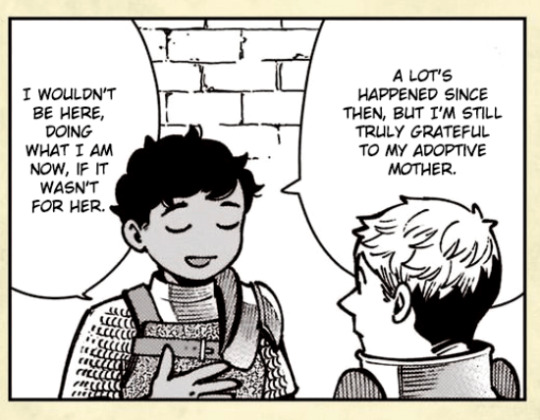
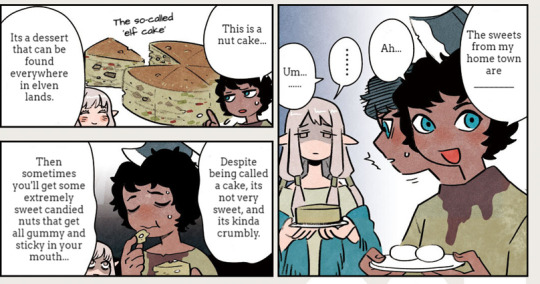
But even if she'd been perfect, living as an trans-racial adoptee in a deeply hierarchical nation with a queen who is a 'staunch traditionalist' who wouldn't even acknowledge the existence of a half-elf like Marcille (according to Cithis) is an experience that would deeply impact anyone.
Elves & Impossible mutual understanding
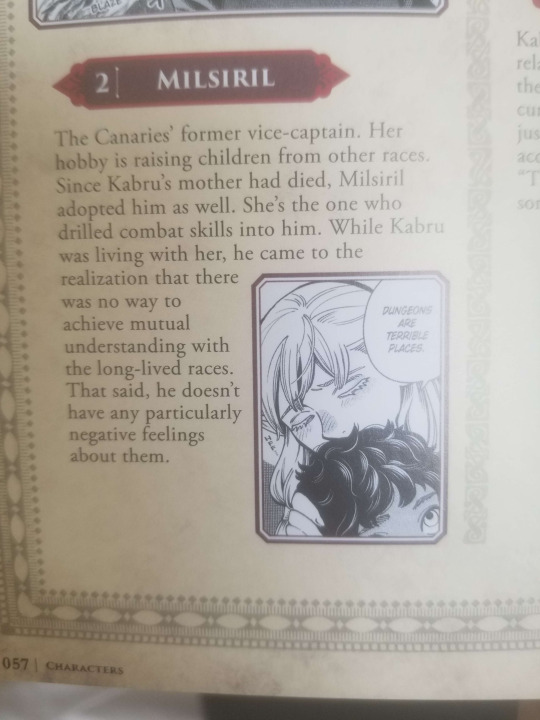
While Kabru was living with Milsiril - in other words, while living in the Northern Central Continent - he came to believe that "there was no way to achieve mutual understanding with the long-lived races."
This is evident in his political project: he wants short-lived races to have ownership over the dungeon's secrets. Despite his dislike of the Lord of the Island, he's a useful bulwark to stop the elves taking over. Despite his doubts about Laios, Laios needs to be the one to defeat the dungeon, because if he doesn't the elves will take over.
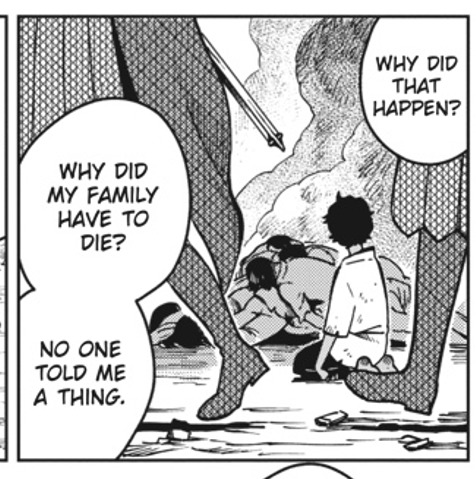
Kabru still carries a deep scar from Utaya, one that was exacerbated by the fact that he never got an answer to any of his questions about what happened or why. This, despite the fact that Milsiril knows about the demon and how it works. Do you think Kabru, with his social perceptiveness that borders on the superhuman, wasn't aware that she knew more than she would tell him?
Given that, the fact that he gets to a place where he "doesn't have any particularly negative feelings about [elves/long-lived species]" .... well, to put it bluntly, I believe that he thinks that's the case, but I kind of doubt it. After all, if he did have resentment, of Milsiril (someone who was his primary provider and caretaker since age six, and who despite her flaws, loves him and who I do think he loves) or of elves (who he has had to play nice with for most of his life, in order to survive, and will still have to play nice with in order to achieve his goals, since they hold all the power) what would that do except hurt him and make his life harder? Kabru is Mr. Pragmatic, so I don't think he'd let himself acknowledge any such feelings he did have. Exactly because he can't acknowledge them, they're well placed to get internalised as beliefs about the Fundamental Unchangeable Nature of the World.
However, these stated beliefs seem to contradict his actions. Despite his belief in the impossibility of forming a mutual understanding, he certainly seems to try to understand long-lived people, just as much as he does short-lived people. There's no noticeable difference between his treatment of Daya & Holm versus Mickbell & Rin that isn't clearly down to their relationship with him. His skills of human analysis were honed and developed while living amongst elves, and as soon as he's alone with Mithrun he immediately sets to understanding him - his interests, his motivations, his needs, and his past.
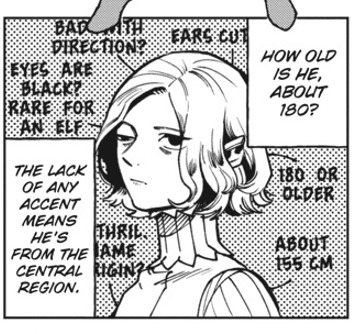
He treats him considerately and without bias, and despite the fact that Mithrun conquering the dungeon for the elves is both a reenactment of a core part of his childhood trauma and a political disaster for his aims, that doesn't seem to colour his perspective on Mithrun negatively at all.
This is something I find extremely laudable about Kabru, and it's another way he parallels Laios. He seems to understand that people, as a rule, (in Laios' case, he understands this about monsters - and eventually, all living beings) will act in their own interests, and if those interests conflict with yours, might harm you. But that's just their nature, and it's not something that should be held against them; you're also doing the same thing, after all. The crux of Laios' arc is precisely that he has to accept the responsibility of hurting someone else in order to achieve what he wants.
Kabru is deeply concerned with his own morals, what he should and shouldn't do, but mostly in the context of responsibility for the consequences - a responsibility he takes onto himself. He isn't scrupulous about what he needs to do in order to create the outcome he wants, but if he fails to create that outcome, then....
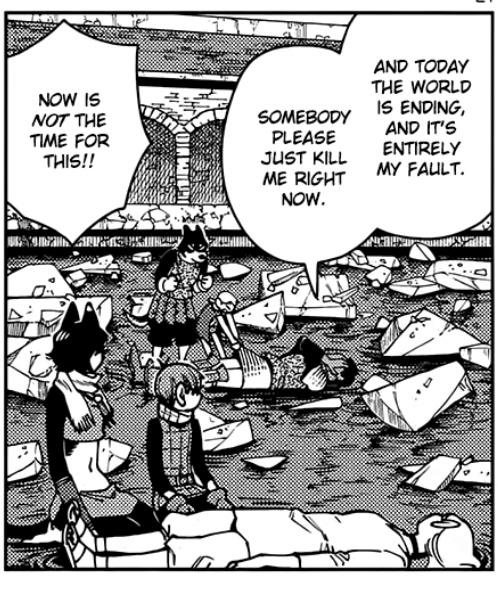
He blames himself to the point of thinking he should die. He doesn't blame Laios, or seem at all angry with him, despite concluding he should have killed him to prevent this outcome. That's because in his eyes, ultimately Laios was going to act according to his own nature, and it's Kabru's fault for not understanding that nature well enough. He's extremely confident in his ability to understand and predict others, (including elves and other long-lived people). Then, where does his conviction that mutual understanding is impossible come from?
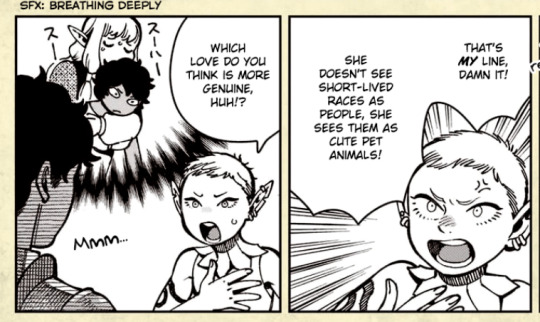
Partially, it's the "mutual" part. I'm sure Kabru, who isn't able or willing to deny Otta's insinuation that Milsiril saw him more like a pet than a son, has felt that his full interiority, the depth of his feelings and his ability to grow, act, and think as a fully equal being, was something that the elves around him just couldn't grasp. Because that was their excuse for it, he came to understand this as a gulf between short-lived and long-lived beings, an inevitable difference in outlook caused by their different lifespans.
This experience might be part of what leads to his iconic “fake” behaviour. He trusts his ability to understand others, but if they aren’t able to understand him, then there isn’t any benefit to being honest about his feelings and thoughts. If his attempts to reach mutual understanding with his caretakers were never able to be fulfilled, then it isn’t any wonder that he reacts with such surprise and horror at blurting out his desire to be Laios’ friend.
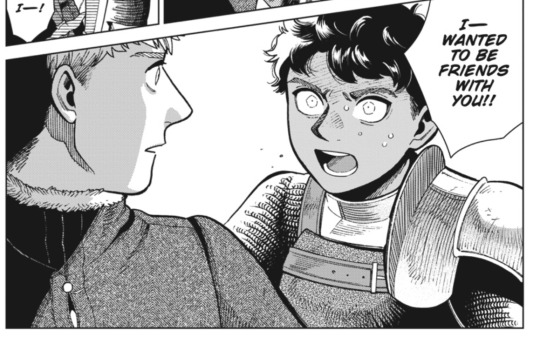
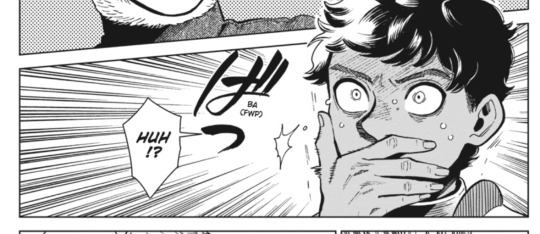
In his experience, making yourself vulnerable in that way only leads to being hurt. Soothing him, hushing him, lying to him, talking to him like a child that isn’t able to use proper judgement – that’s an inadequate and deeply hurtful way to respond to genuine distress, the desire for autonomy, or disagreement. Ultimately, I think that’s why he comes out on the side of being grateful to Milsiril; because she did equip him with the skills and knowledge he’d need to reach his goal, and let him go.
Though he could understand them, they couldn't understand him. To the extent that was true - which I'm sure it was - it wasn't due to anything about lifespan. It was due to the elves’ racism, and the solipsitic mindset & prejudiced attitude that it caused them to approach him with.
Because, if it needs to be said, the idea that there is an unbreachable gap in understanding between the long-lived and short-lived species is not true. Marcille and Laios have a much greater difference in lifespan than any full elf from any short-lived person, and they’re able to understand each other – maybe not perfectly, but better than many other people who are closer in life-span to them.
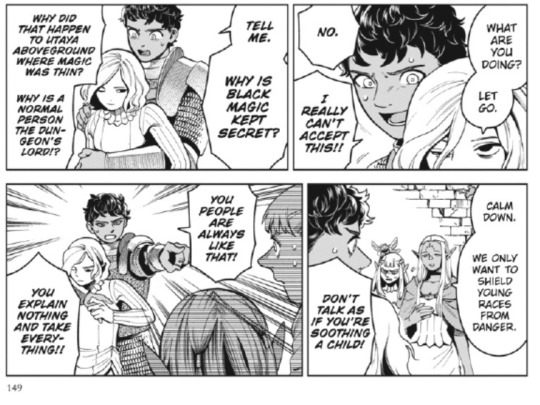
That doesn’t mean that I think Kabru is wrong about this, however. Because there’s an interpretation of his statement that is reflected in his actions and is true. When he talks about his problem with elves, it’s not just their attitudes: it’s their power, and what they use it to do. They “explain nothing and take everything”. Though it’s presented in the guise of ‘guiding and protecting’, in fact it’s a simple case of a powerful nation using their military power, wealth, access to resources, and historically stolen land – including the island itself – to protect their own interests and advance their own agenda. That’s why they’d be able to show up, seize the dungeon, and forcibly take Kabru’s party and Laios’ party to the West. If Kabru wants to stop that from happening, or change that status quo, persuasion or a bid to be understood would be completely pointless. Between the political blocs formed by long-lived species and the interests of short-lived species, “mutual understanding”, given their current, unequal terms, would be impossible. This is something that we see reflected in Kabru’s actions; before he asks his questions about the dungeon, he grabs Mithrun as leverage. He never really attempts to persuade the canaries to see his point of view, because that would be pointless: they’re agents of the Northern Central Continent’s monarchy, and will act in its interests regardless of any individual relationship with him.
I don’t think Kabru sees the different dimensions of this belief of his in quite such clear terms, however, as is evidenced by the other group who he thinks it’s impossible to communicate with.
Demi-Humans & Unknowable Objects
The other place that we see his conviction about the impossibility of mutual understanding is in the kobold extra.
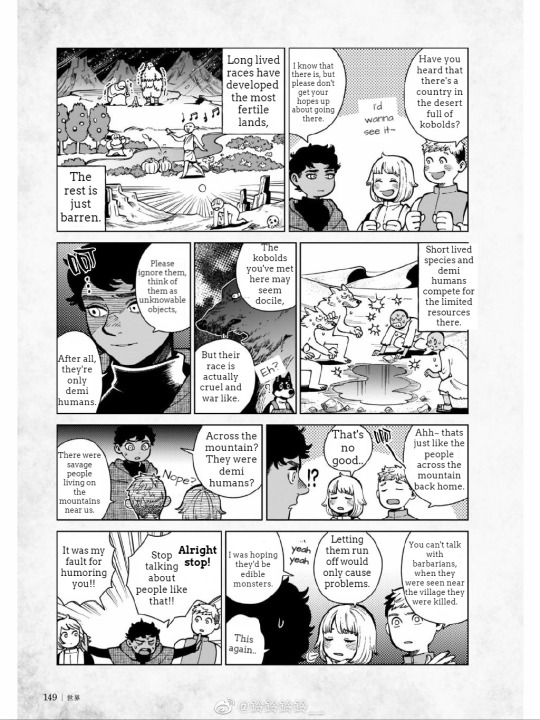
I'm including the whole thing, because I think it's an excellent and clever piece of world-building. Aside from what it says about Kabru, which I'll expand on shortly, what this extra does is deconstruct and call into question the usual "fantasy ontological biology" present in these sort of DnD-like settings. Essentially, the kind of worldbuilding where a race (such as kobolds) can be described as war-like, and that's establishing something essential about their biological nature. That's common to the point that if Kui didn't include this, some people would probably come away thinking that's the case about, e.g., the orcs.
But here, despite what Kabru is saying, the information the reader actually gets is:
the conflict between short-lived humans and demi-humans such as kobolds is mostly over access to material resources that they need to survive.
These resources are scarce because powerful nations, such as the elves, have monopolised them.
Kabru, who has grown up in a place at the centre of these conflicts, ascribes essential, negative traits to a cultural group which was in direct conflict with his own. Communication with this other group is impossible; they aren't people, they're more like objects.
oh yes! just like this conflict between groups of tall-men, a conflict which the reader will immediately interpret as more clearly analogous to real-life racism. Our other protagonists also carry prejudices from growing up in a place where a marginalised group was in conflict with the dominant group over scarce resources. It's definitely impossible to communicate with these people, and you can only kill them.
Woah, when you say it like that, it sounds pretty bad!
But also, nobody walks away having had a realisation or unlearned their prejudices - because they don't have the tools they need to do that work. Yet. I do think, to an extent, it could happen - especially with Kabru, since it's suggested in the epilogue that Melini might become a safe-haven for demi-humans.

To focus in on Kabru, the key here is his statement that you should think of demi-humans as "unknowable objects". Even his extraordinary powers of understanding have seemingly hit a limit. Part of this is just inherited prejudice, and doesn't need to have a complicated psychological explanation, any more than the elves who were prejudiced against him need one.
But also... this is probably somewhat linked to the way demi-humans seem to be considered "pseudo-monsters". They're the place that the strict delineation between the human and the monstrous is permeated. Laios, who is not interested in humans, remembers and is excited by Kuro. Chilchuck and Laios argue over whether it's OK to eat a mermaid. Kabru's prepared to (pretend to) roll with the idea that Laios ate the orcs.
But these are people, aren't they? Of course, this is a social construction, as we see from the fact that in the Eastern Archipelago, the label of "human" is reserved for tallmen, but in most of the rest of the world it depends on some obviously arbirary classification based on number of bones; "demi-humans" aren't in any essential way monstrous, except to an extent in their appearance, and physical location - due to their marginal social status, they're pushed out to live in unsafe places such as dungeons.
Therefore, Kabru's view of demi-humans as fundamentally "other", unable to be understood - monstrous - could be read as akin to abjection, the psychoanalytical concept described by Julia Kristeva. In order to create a bounded, secure superego, that thing which permeates and calls into question the border between self and other, human and animal, life and death, is rejected and pushed to the margin.
“Not me. Not that. But not nothing, either. A "something" that I do not recognize as a thing.[...] On the edge of nonexistence and hallucination, of a reality that, if I acknowledge it, annihilates me. There, abject and abjection are my safeguards. The primers of my culture.” (Kristeva et al., 1984, p. 11) “It is thus not lack of cleanliness or health that causes abjection but what disturbs identity, system, order. ” (Kristeva et al., 1984, p. 13) “The pure will be that which conforms to an established taxonomy; the impure, that which unsettles it, establishes intermixture and disorder. [...] the impure will be those that do not confine themselves to one element but point to admixture and confusion.” (Kristeva et al., 1984, p. 107) (discussing food prohibitions in Leviticus)
This is both (due to its affinity with food-loathing and disgust) a very fruitful concept to apply to dunmeshi, and a psychoanalytical theory which I wouldn't exactly cosign as True Facts About Human Psychological Development. You may also know the abject from its utilisation in the classic essay "Horror and the Monstrous-Feminine" by Barbara Creed - that's a lot more approachable than Kristeva if anyone's interested.
Key here, though, is that through the symbol of the "demi-human" is embodied a step between "human" and "monster" - and that's a prospect that puts at risk the whole notion of an absolute separation between those two categories in the first place. To Laios, that's something wonderful, and to Kabru, it's terrifying. We can see this principle further embodied in the relationship both characters have with the notion of becoming monstrous.
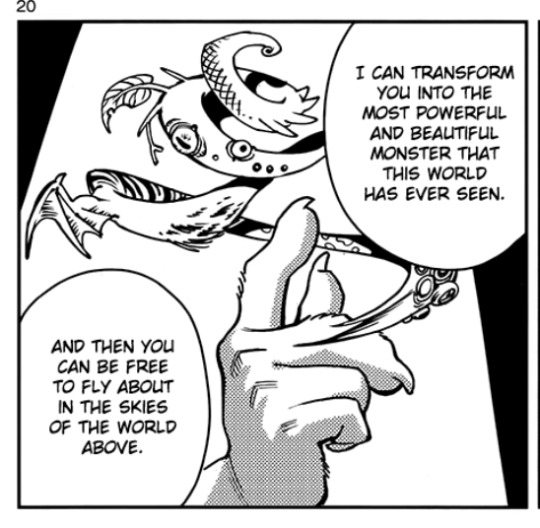
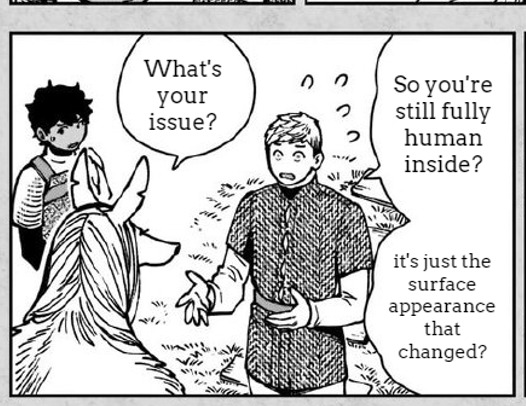
To Laios, this is transcendent, and represents a renunciation of everything human - in fact, if it didn't, it wouldn't "count".
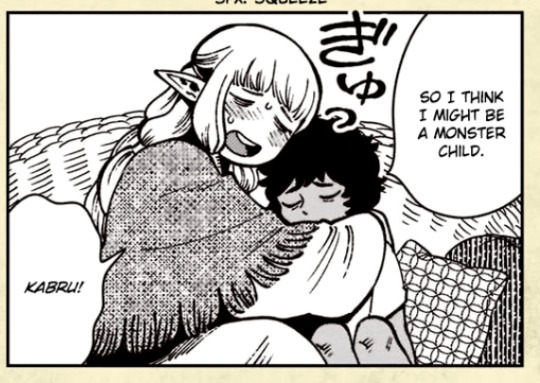
To Kabru, it's a deeply-held fear, established by his childhood alienation (due to his illegitimacy, his eyes, and perhaps also his neurodivergency), deepened by monster-related trauma and the sense of responsibility and survivors guilt he feels for what happened at Utaya. His identity as a human who is not monstrous is key to his sense of stability and safety; he doesn't want to touch monsters, he doesn't even want to see them.
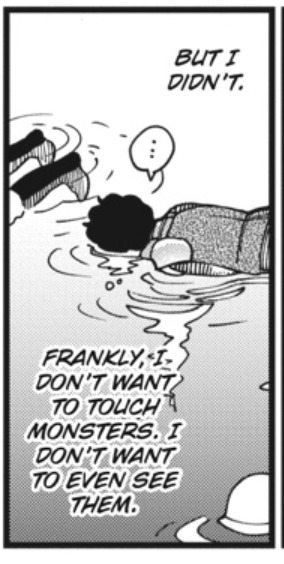
To acknowledge a kinship, a possibility of similarity between the things he loves (humans) and the things he hates (monsters) would be more than touching them - it would be putting them inside him. We know, quite explicitly, that this notion is triggering to Kabru. He literally has what seems to be a flashback when he's about to eat the harpy omelette.
So he abjects it, classifying the demi-human as fundamentally unlike him - an unknowable object, or an object that he refuses to know. Because in understanding it, he would interject the things he hates and fears into his self, which is already, always under threat by that hated and feared object.
Of course, again, Kabru isn't very good at enacting this refusal in practice. For one, when he chooses between his desires and ingesting the feared object, eating monsters... he eats monsters. Part of this is treating himself badly, the "ends justify the means" mentality. His goal is to destroy all monsters, so if he needs to become monster-like to do that, he will. But part of it is also the other motivation that he didn't even seem to know about until he said it: he wants to become Laios' friend, and to learn from him how a person can like monsters. He wants, at least in some part of him, to reconcile the feared and hated object into something he can understand.
For another:
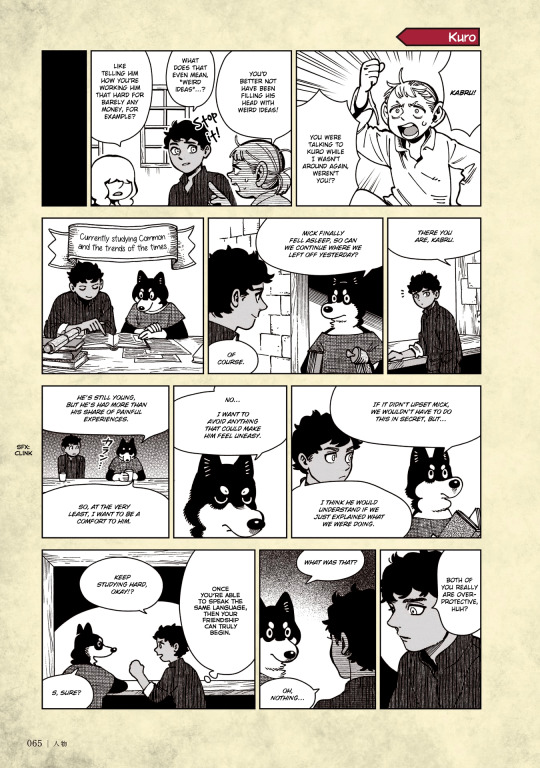
Kabru can speak the kobold language. In the first place, while this may have been common in Utaya, it also could have been something he chose to learn, an early expression of his interest in understanding and talking to all sorts of people. It isn't the kind of thing you learn if you believe that communication between yourself and the group that speak it is impossible, is it?
It's possible to harbour prejudices against a group while being kind to an individual, and given Kabru has those prejudices regardless of his reasons, that is what he is doing. But also, his treatment of Kuro doesn't reflect a sincerely held belief that he's an "unknowable object" at all. His approach is exactly the same as it is to any other person: an analysis of goal and motive, and an attempt to help if he's sympathetic and their goals align - going out of his way to give language and local knowledge lessons in secret. His conviction that Mickbell and Kuro will truly become friends when they can properly communicate is completely contradictory to any sense of demi-humans as fundamentally different, or impossible to reach mutual understanding with. To me, it seems like this self-protective shield against the corruptive force demi-humans as an idea present to his identity, this abjection, when Kabru is face-to-face with one, just simply can't hold up against his finely honed skill of intellectual empathy. Perhaps because he's autistic, it seems his "empathy" is less an emotional mirror response, and more a set of cognitive skills for analysis of others. That instinctual, emotional empathy might not trigger when presented with a member of an out-group, but if it’s possible for Kabru to turn his cognitive empathy off, we don’t see him do it.
This isn't to say that this prejudice doesn't affect his behaviour. For one, it could negatively impact his judgement of politics and policy, where individual people don't enter into it. For another, I'm not convinced he'd be willing to overlook Mickbell's exploitative relationship with Kuro if Kuro wasn't a kobold. As it is, since both of them are satisfied, he doesn't feel like he needs to intervene, regardless of the fact Mickbell isn't paying Kuro. But if Daya and Holm were in a relationship, and Holm took both Daya's and his own share from their ventures, but only compensated her in living expenses and kept the rest, do you think he'd tolerate it, for example? Even if she said it was OK?
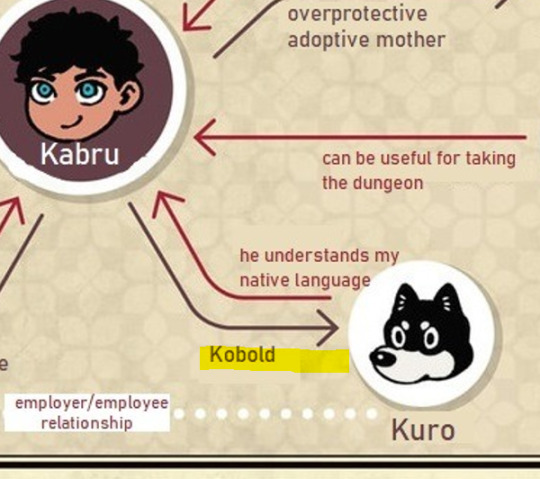
Conclusion

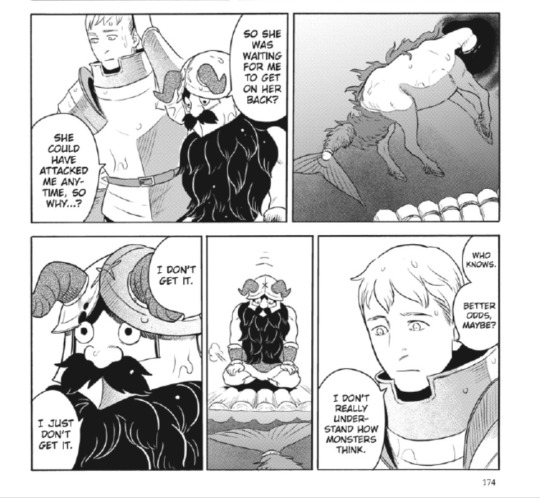
The kelpie chapter establishes that "people can never know what monsters are really thinking." That isn't just true of monsters, though.
True mutual understanding is impossible - between anyone. We can never truly understand another person's heart. This is touched on in, for example, the existence of shapeshifters and dopplegangers. Even a monster that seemed like a perfect copy of a person wouldn’t be that person, and wouldn’t be a satisfactory replacement.
We’re intended, I think, to understand the winged lion's repeated suggestions to just replace people who have been lost with copies as something uncanny, which demonstrates the way that the winged lion never manages to attain a complete understanding of humans. A version of a person who was created to fulfil your memories of them, to be the person who you wanted them to be, would be a terrible, miserable thing.
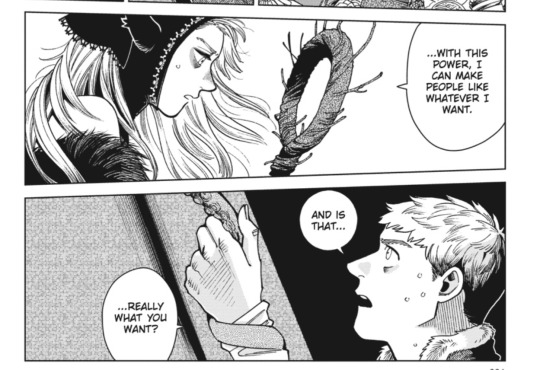
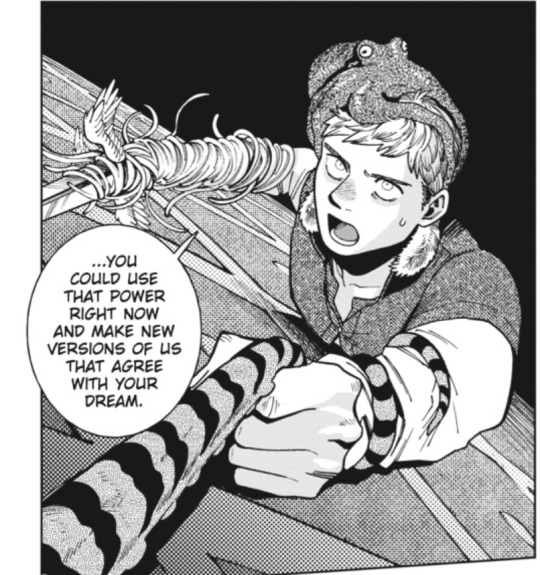

Disagreeing, coming into conflict, and misunderstanding each other, are essential parts of what it means to be living beings, as fundamental as the need to eat.
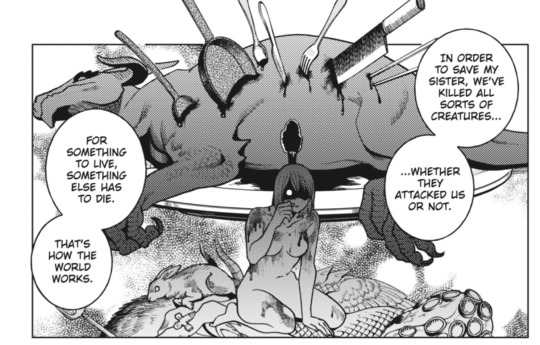
The only thing to do is not to take more than you need to eat to survive, and not impose your own desires onto others. To do your best to sincerely communicate your desires, even if they're embarrassing or vulnerable or strange, like Kabru eventually does with Laios; like Laios does, bit by bit, with the people around him; like Marcille does, Chilchuck does, Senshi does... to hope they will accept you, and do your best to understand them in return.
We can re-examine, in that context, Kabru's line about the elves' tendency to "explain nothing and take everything".
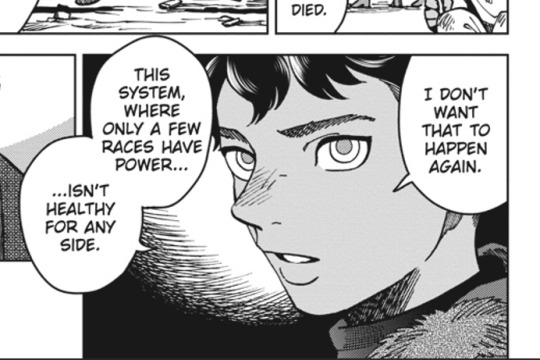
They have the power to impose their preferred "menu" onto less powerful groups. And in that context, mutual understanding being impossible just means that they won't give up their power because they're asked nicely. Kabru's goal is to seize the truth that they won't give to him, and to create a situation where they can't take everything. Because he's accurately surmised that nothing about the treatment of short-lived races will change so long as the power imbalance remains. Despite the way he mistakenly ascribes part of that to "long-lived vs short-lived" or "human vs demi-human", the actual gulfs in understanding he identifies are structural, are about power and about access to material resources and safety.
I think he could come to recognise this. Yaad is teaching him political science after all, and while a prince's lessons on political science won't exactly get at much that's radical or invested in the interests and perspectives of the marginalised (Capital is a critique of for a reason after all...) I believe in Kabru's ability to learn critically and get more from a lesson than it was intended to teach.
#so worth the read#and honestly quite inspiring#there’s so much to Kabru’s character and how our understanding of him really fleshes out the world of dungeon meshi#his motivations inform the audience of big stakes like racial politics and heirarchy#when you think of his upbringing around elves and having lost his home it really makes sense why he’s hyper aware of social dynamics#it’s as much a survival mechanism as it is a deep passion#and these things are often two sides of the same coin in dungeon meshi#i’m going to keep coming back to this post because there’s sooo much here to disect#and just so well written and thought out too#essential reading for Kabru lovers#kabru of utaya#dungeon meshi#delicious in dungeon#loriache#thank you op!
2K notes
·
View notes
Text
Shiani has such enormously wasted potential in dragon age lore
#will never forgive how the plot treats her#the explocit racially motivated rape survivor raised to nobility and political representation of her group#and the just throw that away on thay epilque and for what#dragon age
1 note
·
View note
Text
What is so fascinating about the anger and venom that we see on social media in the wake of Donald Trump's victory is that it is not merely partisan political anger, which is fine and to be expected. Call Conservatives whatever you like. But what we are seeing are women denouncing all males, black women denouncing all white people and all black men, and other minorities denouncing Latino men etc. This is a rage and a hostility that is leveraged across sex lines, racial lines, ethnic lines etc. Everyone resents and blames everyone else as a group.
It is a revelation of something that I have said for years. There is no true unity on the American political Left. It is instead an uneasy and fragile coalition of groups united by a fear of a common bogeyman. And people who are not motivated by fear, bitterness, anger and resentment are increasingly disenchanted with the modern Left, which by its ideological design puts one group against another instead of unifying human individuals under a single flag.
329 notes
·
View notes
Text
#racially motivated police brutality#police brutality#vital community#vital information exchange#vitalportal#additional information#thevitalportal#vital media#blacklivesmatter#blacktwitter#vital politics
1 note
·
View note
Text
on the racist riots in Belfast
i made a post in 2021 titled "dispatch on the unrest in Belfast" (click) trying to provide some local-knowledge context for the sectarian riots in town. i have no such special knowledge to offer this time. it has been, to be honest, shocking to me how many people came to them and how well organized they were. we have seen an increasing prevalence of anti-immigrant racism in the north in recent years; graffiti saying "locals only" (simple meaning: "whites only") on council houses going to market has been reported on since 2014 (click, 2018 click, 2023 click), for example. and in 2022 the PSNI released a report stating that hate crimes of every kind, including racist hate crimes, had reached the highest of any year since they began counting in 2004/5 (click). according to the BBC as of 2014 "on average a racially motivated offence takes place at least once a day" in Belfast (click) and it has only risen since that. but it was obviously not organized at this scale before. my girlfriend remarked that this was the first time Northern Ireland has had a race riot and i think, assuming we treat sectarian riots as something else, that may be true? (the UK-wide 1919 race riots did not seem to affect Ireland from what i could find and anyway were a bit before partition; otherwise they are quite similar to what is happening today).
perhaps no further context is really possible to give; they are race riots and they are happening because of racism. nevertheless i will try and write down some things i've thought about it.
in the 2021 post i talked about the nature of the disorder, where if you looked at the footage mostly people stood on the pavement and watched while the professionals—loyalist paramilitaries—handled the direct action (hijacking and burning busses and such). that is because these demonstrations were organized by the paramilitaries and everyone must obey them. that is not the case here; the crowds attack people of colour and immigrants, their homes or businesses owned by them, wherever they can find them. if they were kicked out of one area they went somewhere else and did it there; or else they did it where they lived as on Sandy Row. so it seems to be genuinely spontaneous and not directed from above.
the paramilitaries claim they did not organize it (the Belfast Telegraph quote what they call a 'senior loyalist' saying "[w]e didn’t start this, we aren’t behind it" click—what a demonstrative article, by the way, the police asking the paramilitaries for help with population control!). they say that about everything, but i think i believe them this time for that reason. it doesn't look paramilitary. i suppose whoever organized it must be taking orders from England. however, we are aware of at least some involvement by paramilitaries. the rightists who travelled up from Ireland were identified by PSNI and Gardaí to be fraternizing with UDA men (click). blueshirts associating with loyalists is not really surprising but i am not sure it has happened before. PSNI also claim there is a "paramilitary element" within the racist riots but are reluctant to say they're behind them (click).
i have talked before about how loyalism has felt a bit of a transition from an armed struggle into something that looks like a popular movement, with demonstrations and direct action becoming the main source of spectacle. it's possible there is a gradual transition towards this point, where paramilitary hierarchy becomes secondary to a spontaneously organized reactionary movement.
it also fits into a pattern that i have talked about before (click, also here), which is that democracy in the north has undergone dramatic changes recently. whereas in the past the national conversation dominated politics, today ordinary issues of civil society are decisive. the DUP lost their monopoly on unionist voters because of how they handled COVID, the border, the cost of living and so forth—problems a normal political party is expected to solve, not a party holding down a sovereignty under siege as they were supposed to be—and that's why SF got the majority. immigration is one such 'normal' political issue, and racist violence breaks out in Belfast in a way that doesn't differ substantially to how it breaks out at the same time in a normal country like England.
speaking of the fracturing of the DUP, i felt that it was significant that we could name, as a precipitating event, the fracturing of the right wing parties in general. in the north of Ireland the DUP lost much of its support, but no single party could replace it; several unionist parties now leech its vote, while moderate unionists vote for Alliance. and in the recent election the Tories lost to Labour, but they also lost many seats to Reform. between SF and Labour we are in an era where for the first time in a long time the UK is governed by center left parties, meanwhile it is unclear what opposition has the mandate of the right-wing voter. this means that for a right wing person electoral party politics looks like an ambiguous, distant and unrewarding terrain of struggle. perhaps that is a background condition as to why racist propagandists have been able to mobilize so many people into joining these events.
something else that struck me as possibly a precipitating event is that for the better part of a year we've had extremely active and persistent organizing around Palestine in the UK, in terms of demonstrations, direct action and even in electoral politics (with several independent candidates who care about Gaza taking seats from Labour in the last election). thus, right-wing racists have seen news about pro-Palestine organizing almost every day for a long time. we know that here in the north when Palestinian flags are flown it isn't long before Israel flags are flown in response. i think it's possible to see the specifically anti-Islamic character of the riots as a kind of counter-revolution or reaction to Palestine.
those were the thoughts i had to share. on Friday 9th (today as i write this) there is a racist demonstration planned, as well as a counter-protest. the counter-protest is backed by NIPSA (a big NI union) as well as the Belfast City Council (! click), so perhaps it will be big. it starts at 4:30pm. stay safe.
165 notes
·
View notes
Text
I attended a seminar today on building community resilience to radicalization to violence. The lecture was really informative and covered a wide spectrum of different types of extremism, including political, gender motivated, racial, etc. I don't feel the need to share all of the information here, because the focus was primarily on radicalization in my state specifically, but I did want to share this specific part on identifying indicators that someone is on the path to, if not fully, radicalized:
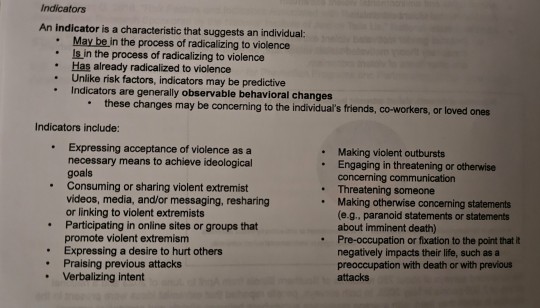
If you see any of these in your community, call it out!
This is what has been proven to lead to mass attacks against marginalized groups.
If you see something, say something!
#extremism#bigotry#information#jumblr#there's a training class for becoming an educator on this that i plan on taking#because not enough people were at that seminar#and a lot more people needed to hear it
346 notes
·
View notes
Text
It is immensely difficult to understand just how completely white Southerners wrote off slaves in their political calculations. How, we ask, could they contemplate war without worrying about the possibilities it opened up to four million enslaved people? But so irrelevant were slaves to their thinking that William Yancey, the influential Alabama fire-eater, could recommend secession as a resolution of all the old struggles. It would augur, he said, a future with "no irrepressible conflict and no domestic enemy to incite our vigilance." Black Republicans--that is to say, white Northern men and not slaves--were the domestic enemy Yancey had in mind.
Southerners of all political persuasions worried publicly and to good effect about the way abolitionists incited slaves to violence. One can readily discern the heavy weight of racial thinking about people of African descent. It was hard for white Southerners to think of slaves as "the enemy within." More than thirty years of proslavery training had mostly dissuaded them from that view. But the fear lurked just below the surface, and a benevolent paternalism always confronted a deeper antagonistic view. One can hear their conflicting emotions when white Southerners learned of John Brown's attempt to raise slave support in his raid on Harper's Ferry. One contributor to the Charleston Mercury opened with a brave denial that planters had anything to worry about at all--"they would as soon suspect their children of conspiring against their lives"--but descended quickly into a tortured consideration of circumstances in which slaves might indeed pose a threat. When "constantly tampered with," the writer fretted, faith in the Africans' good nature could prove a flimsy defense. "Our negroes are constantly tempted to cut our throats or pink us" with rifles. It was well to be prepared for the worst. Those "foot peddlers" from New York trolling the neighborhoods could "put the devil in the negros' heads," and could have been down there already "for all we know, arming the troops." The conflicted view of slaves' nature was palpable but controlled. Slaves were said to be, by nature, good, childlike, and loyal servants to their masters; they posed a danger only when white outsiders attempted to "rouse an ignorant people [by appealing] to their superstition and lust." Thus when secession dispensed with the Black Republicans, as Yancey promised, slaves would no longer represent a force of any sort.
[...]
African slaves in New World societies underwent a process of instrumentalization rather than simple suppression or exclusion. White Southerners were so deeply implicated in that process that they had great difficulty shaking an instrumentalist view of African American people even when confronted with evidence to the contrary. Rare, indeed, was the commonsense observation like that of Waltman Willey, a western Virginia Unionist, who, disparaging the secessionists' argument that slavery would be safer out of the Union, asked bluntly what the consequences of destroying the Union would be: "What then. The common national obligation [to return fugitive slaves] is destroyed. Will not the negro find out? The motives to flee across the line would be increased, because he would know that whenever he crosses that line he will be free." What Willey predicted was precisely what most white Southerners denied: that slaves had motives and interests entirely their own, channels of communication that kept them apprised of relevant developments, and allies whose help they knew to seek. It would take Confederates a long time to learn those lessons.
stephanie mccurry, confederate reckoning: power and politics in the civil war south
#the thing is that people dehumanize other to the point of complete delusion so often throughout human history without interruption#and i just.... find it so so so so satisfying..... to spend time contemplating a time it turned out to fucking bite them in the ass#they really convinced themselves they were god kings of the world. and the world proved them wrong.#you just almost never get to see that. you almost never get to see this kind of shit and know#that there came a point where these losers had to confront how wildly wrong they had been.#confederate reckoning#bookblogging#media 2k24
80 notes
·
View notes